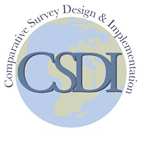- Home
- About us
- Initiatives
- Events
- 2024 CSDI Workshop
- Past Events
- 2023 CSDI Workshop
- 2022 CSDI Workshop
- 2021 Virtual CSDI Workshop
- 2019 CSDI Workshop
- 2018 CSDI Workshop
- 2017 CSDI Workshop
- 2016 3MC Conference
- 2015 CSDI Workshop
- 2014 CSDI Workshop
- Archive
- Forum
- Additional Resources
- Contact Us


Quality Monitoring
Fieldwork Design in Multiple Countries: Moving To A Model For More On-Time Monitoring of Fieldwork
Salima Douhou, City University of London
New CSDI initiatives for consideration
Tim Johnson, University of Illinois at Chicago, Beth-EllenPennell, University of Michigan, and Lars Lyberg, Inizio
Translation and Translation Tools
When offering a translated version is not enough: Hispanic monolinguals’ device use and web literacy: Implications for web survey design and testing
Alisú Schoua-Glusberg, Research Support Services
Assessing the impact of different German-language translations of ESS Round 3 items on the resulting data
Dorothée Behr, GESIS-Leibniz Institute for the Social Sciences
Experiment for testing questionnaire translation methods in the European social survey (ESS): Ask the same question versus more adaptive approaches
Brita Dorer, GESIS-Leibniz Institute for the Social Sciences
Asking Moses to help with translation verification
Yuri Pettinicchi, Max Planck Institute for Social Law and Social Policy (MPISOC)
Evaluating Data Quality and Identifying Fraudulent Cases During and After Fieldwork
Usage of a method for ex-post identification of falsifications in cross-cultural context
Natalja Menold, GESIS-Leibniz Institute for the Social Sciences
Identifying fake interviews in a cross-national panel study
Michael Bergmann, Technical University of Munich, Munich Center for the Economics of Aging (MEA)
Monitoring the evolution of the fieldwork power: Illustration based on the seventh round of the European Social Survey
Caroline Vandenplas, KU Leuven
Effects of fieldwork delay on subjective wellbeing results due to seasonality in the 4th European Quality of Life Survey
Eszter Sandor, Eurofound
“Curbstoning”: case study of an elaborate interviewer falsification scheme and new procedures to prevent interviewer fabrication
Frederic Malter, Max Planck Institute for Social Law and Social Policy (MPISOC)
Using timestamps for the evaluation of data quality
Gijs van Houten, Eurofound
Innovative Uses of Technology & Tools
A geographic analysis on literacy in multilingual and multicultural contexts
Suehye Kim, UNESCO Institute for Lifelong Learning
Optimizing interactive voice response data quality: Lessons learned from Bangladesh, Tanzania & Uganda
Abigail Greenleaf, Johns Hopkins University
The DGML R Package: Documenting and generating multilingual questionnaires with explicit reference to a XML structure
Dominique Joye, FORS, University of Lausanne
CAMCES tool demo
Silke Schneider, GESIS-Leibniz Institute for the Social Sciences
Web Surveys
Device switching: What we learned from web survey logins
Gina Cheung, University of Michigan
Where do web surveys work? A multilevel meta-analytical approach to determine country-level impact on response modes
Jessica Wengrzik, GESIS-Leibniz Institute for the Social Sciences
Interviewers in 3MC Surveys
Do bilingual interviewers perform differently than monolinguals?
Emilia Peytcheva, RTI International
Interviewer effects in a multilingual face-to-face survey on financial behavior: Evidence from Zambia
Markus Frölich, University of Mannheim
Planning and evaluation of a doorstep training initiative for bilingual interviewers at the U.S. Census bureau
Patricia Goerman, U.S. Census Bureau
Comparative Measures in 3MC Research
Using experiments to reducing comparison error in crossnational surveys with special focus on question wording
Tom W. Smith, NORC at the University of Chicago
Measuring total net household income in interviews of crossnational social surveys with an emphasis on comparative research
Uwe Warner, University of Giessen, Germany
Measuring labour status in interviews of cross-national social surveys with an emphasis on comparative research
Jürgen Hoffmeyer-Zlotnik, University of Giessen, Germany
Synergies for Europe’s Research Infrastructures in the Social Sciences (SERISS)
Design and recruitment of a probability based cross-national online survey (CRONOS) panel
Elena Sommer, City University London
The use of sampling frames in European studies
Annette Scherpenzeel, Economics of Aging, Technical University of Munich
The Translation Management Tool (TMT) used for a survey applying the TRAPD model: The example of the European social survey (ESS), Round 8
Brita Dorer, GESIS-Leibniz Institute for the Social Sciences
The Data Harmonization Explosion: New Developments from the Field
Validity and comparability of the educational attainment measure in OECD PIAAC study
Silke Schneider, GESIS-Leibniz Institute for the Social Sciences
Applying ex-post harmonization of corruption items from cross-national survey projects
Ilona Wysmulek, Institute of Philosophy and Sociology of the Polish Academy of Sciences
Item-level controls for ex-post harmonization of crossnational survey data: Theoretical arguments and empirical illustration
Kazimierz M. Slomczynski, CONSIRT at The Ohio State University and the Polish Academy of Sciences
Self-identification of occupation in web-surveys: Respondents choice between autosuggest and search tree
Kea Tijdens, University of Amsterdam/AIAS
Harmonization of the minority status: Case of the Russian speaking minority in the former Soviet states
Olena Oleksiyenko, Institute of Philosophy and Sociology of the Polish Academy of Sciences
Response Style Bias
Item attributes as drivers of acquiescent response style
Rachel Davis, University of South Carolina
Classifying acquiescent respondents: convergence or divergence of categorization approaches?
Sunghee Lee, University of Michigan
Cross-cultural Survey Guidelines and Short Courses: Update
New and expanded cross-cultural survey guidelines
Beth-Ellen Pennell, Julie de Jong, Jamal Ali, University of Michigan
Questionnaire Development
Maximizing questionnaire design in cross-national and crosscultural surveys
Tom W. Smith, NORC at the University of Chicago
The longer, the better? Selection of appropriate crossnational indicators of response quality in open ended questions
Katharina Meitinger, GESIS-Leibniz Institute for the Social Sciences
Ingroup bias and its implications for using visual images in computerized surveys
Sunghee Lee, University of Michigan
Interview Privacy
Measuring third-party presence during face-to-face interviews: Respondent and interviewer predictor effect on reporting sensitive attitudes in Jordan and Turkey
Julie de Jong, University of Michigan
Cross-national establishment survey about interview privacy practices
Zeina Mneimneh, University of Michigan
Advancing 3MC Survey Research and Other Topics
The effect of respondent commitment on response quality in two online surveys
Kristen Cibelli Hibben, University of Michigan
3MC project management
Peter Ph. Mohler, COMPASS
Advancing 3MC survey research
Tim Johnson, University of Illinois at Chicago
Lars Lyberg, Inizio